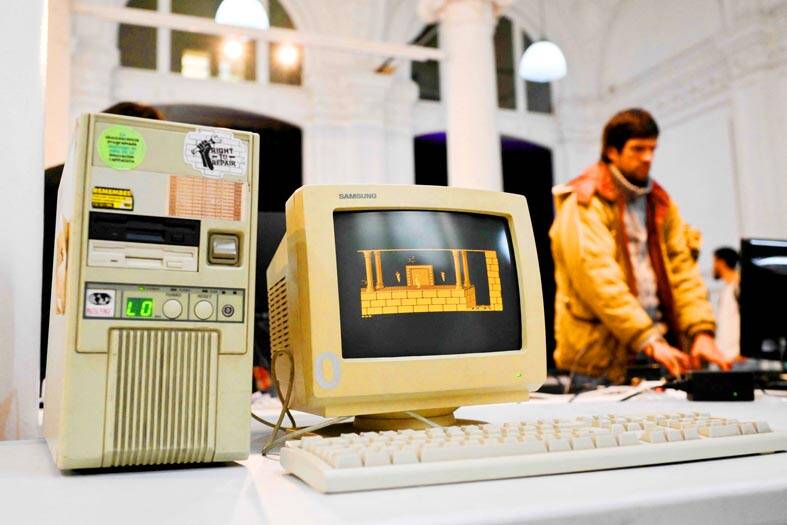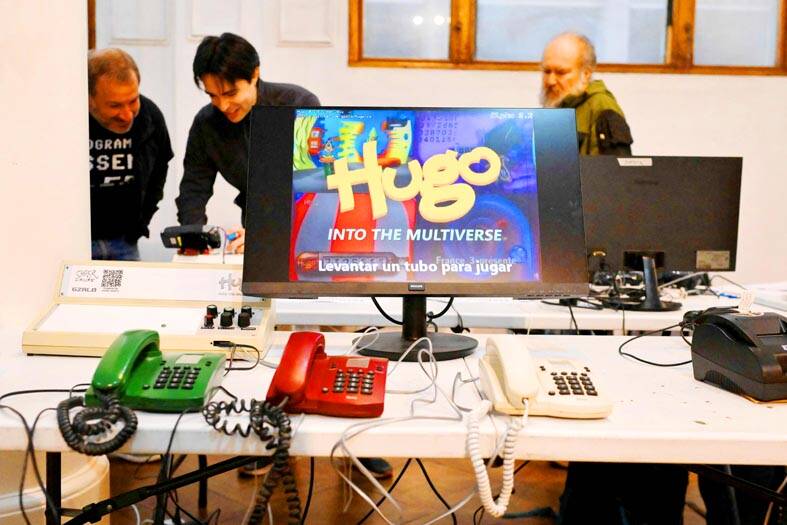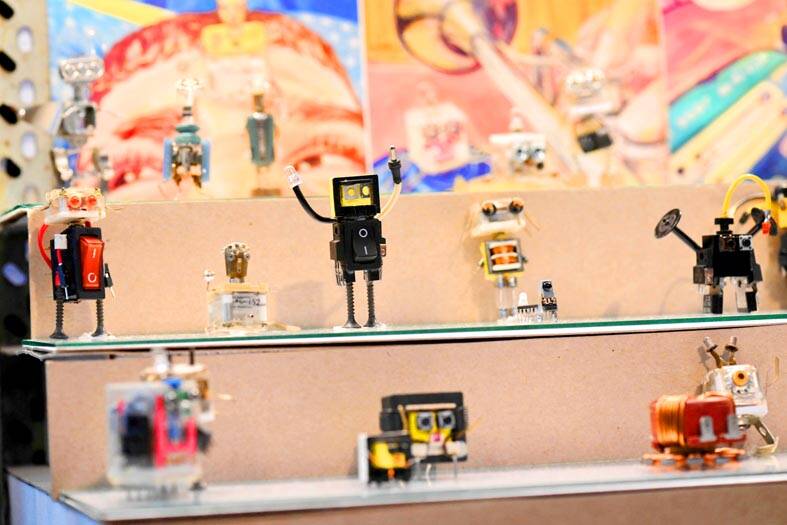Need a new gaming console? Just make one yourself with an old ventilator. Got an old payment terminal? Turn it into a camera.
These are just some of the creations of Argentina’s Cyber Dumpster Divers, a collective of ingenious tech aficionados who turn e-waste into new products.
“We experiment with technology by trying to recycle it and repurpose items that other people would simply throw away,” said Esteban Palladino, a musician who goes by the pseudonym Uctumi on social media.

Photo: AFP
“It’s a movement that has a charitable side, a techno-political side, and also a playful side,” he added.
Argentina produces an estimated 520,000 tonnes of electronic waste per year, making it fifth in the Americas after the US, Brazil, Mexico and Canada, a report released last year by the UN Research Institute for Social Development showed.
In 2022, the world generated a record 62 million tonnes, the report said.

Photo: AFP
The manifesto of the Cyber Dumpster Divers, who have dozens of members across Argentina, says that faced with “the immorality of equipment thrown in the trash, the ... diver rebels against the authority of the market.”
The waste pickers see themselves as revolutionaries at war with the tech “oligarchy.”
They call their provincial chapters cells, their manifesto is modeled on that of Karl Marx, and their posters feature a cyborg Che Guevara, who was born in Argentina.

Photo: AFP
The movement began in 2019 with hardware soup kitchens where people exchanged electronics parts.
During the COVID-19 pandemic, it gained impetus because many people suddenly needed computers to study or work at home.
In stepped the recyclers.
They resurrected old machines from the trash heap, fitted them with free operating systems and donated them to people and organizations in need.
The collective’s third annual meeting in Buenos Aires included a workshop on reviving defunct smartphones.
Visitors also lined up to play the “Ventilastation,” a gaming console made from an industrial fan, and to learn how to run artificial intelligence applications locally on old computers.
“Old things work,” read a slogan on the screen.
Electronics engineer Juan Carrique traveled 470km from the central province of Santa Fe to present “roboticlaje” or robotic recycling.
Carrique goes into schools to teach children how to use e-waste to build temperature sensors or motor controls.
“It’s not the same to buy something ready-made as having to make it yourself, using pieces of trash,” he said.
The 47-year-old diabetic is a fierce critic of planned obsolescence — companies programming products to become out of date after a certain period.
He used a free app to make his blood sugar monitor compatible with his phone, extending the device’s manufacturer-specified lifespan.
It is about “reclaiming the right to recognize when things work or don’t work, not being told they work or don’t work,” he said.
While giving a second life to old electronic devices might seem the height of geekiness, the Cyber Dumpster Divers are wary of the impact of smartphones, particularly on Argentina’s youth.
“It’s this ecosystem that is destroying the social fabric, destroying the psyche of young people,” said Cristian Rojo, one of the recyclers.

Indonesia yesterday began enforcing its newly ratified penal code, replacing a Dutch-era criminal law that had governed the country for more than 80 years and marking a major shift in its legal landscape. Since proclaiming independence in 1945, the Southeast Asian country had continued to operate under a colonial framework widely criticized as outdated and misaligned with Indonesia’s social values. Efforts to revise the code stalled for decades as lawmakers debated how to balance human rights, religious norms and local traditions in the world’s most populous Muslim-majority nation. The 345-page Indonesian Penal Code, known as the KUHP, was passed in 2022. It

‘DISRESPECTFUL’: Katie Miller, the wife of Trump’s most influential adviser, drew ire by posting an image of Greenland in the colors of the US flag, captioning it ‘SOON’ US President Donald Trump on Sunday doubled down on his claim that Greenland should become part of the US, despite calls by the Danish prime minister to stop “threatening” the territory. Washington’s military intervention in Venezuela has reignited fears for Greenland, which Trump has repeatedly said he wants to annex, given its strategic location in the arctic. While aboard Air Force One en route to Washington, Trump reiterated the goal. “We need Greenland from the standpoint of national security, and Denmark is not going to be able to do it,” he said in response to a reporter’s question. “We’ll worry about Greenland in

PERILOUS JOURNEY: Over just a matter of days last month, about 1,600 Afghans who were at risk of perishing due to the cold weather were rescued in the mountains Habibullah set off from his home in western Afghanistan determined to find work in Iran, only for the 15-year-old to freeze to death while walking across the mountainous frontier. “He was forced to go, to bring food for the family,” his mother, Mah Jan, said at her mud home in Ghunjan village. “We have no food to eat, we have no clothes to wear. The house in which I live has no electricity, no water. I have no proper window, nothing to burn for heating,” she added, clutching a photograph of her son. Habibullah was one of at least 18 migrants who died

Russia early yesterday bombarded Ukraine, killing two people in the Kyiv region, authorities said on the eve of a diplomatic summit in France. A nationwide siren was issued just after midnight, while Ukraine’s military said air defenses were operating in several places. In the capital, a private medical facility caught fire as a result of the Russian strikes, killing one person and wounding three others, the State Emergency Service of Kyiv said. It released images of rescuers removing people on stretchers from a gutted building. Another pre-dawn attack on the neighboring city of Fastiv killed one man in his 70s, Kyiv Governor Mykola